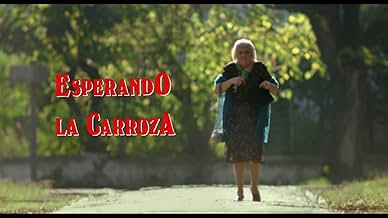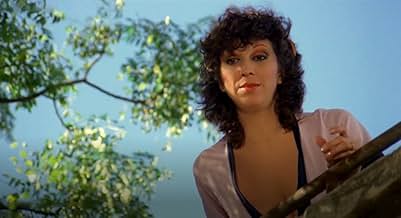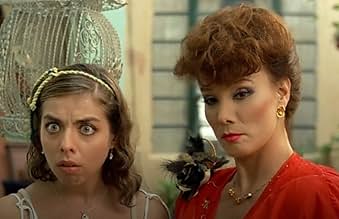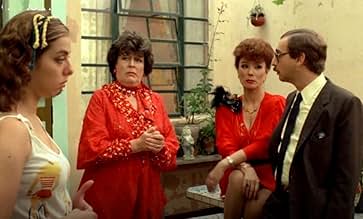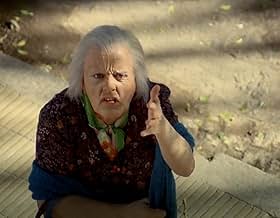Esperando la carroza
- 1985
- 1 Std. 34 Min.
IMDb-BEWERTUNG
8,0/10
7905
IHRE BEWERTUNG
Füge eine Handlung in deiner Sprache hinzuEach member of this family tries to endorse someone else to care for the old Mother.Each member of this family tries to endorse someone else to care for the old Mother.Each member of this family tries to endorse someone else to care for the old Mother.
Empfohlene Bewertungen
This film, boisterously noisy and overcharged with frantic bursting vitality, shows us a slice of Mediterranean life in a Buenos Aires (Argentina) humble working class neighborhood (Buenos Aires includes 49 neighborhoods and 11 million inhabitants, including the surrounding jurisdictions). Only half a dozen of them could be considered middle class, another four or five high class; the rest the working, poorer class.
From the beginning the tottering figure of Mamá Cora (Antonio Gasella in drag and full make up as an old lady), dizzily walking alone towards the camera in a long shot, accompanied by Feliciano Brunelli's accordion yodeling a sort of polka music from the 50s (he was extremely popular with the masses at that time), sets the mood for what is coming (And what is coming is consistently and relentlessly amusing and in crescendo to the very end of the movie, here again, the very cheerful Feliciano Brunelli's accordion closes the last credits, and you feel like having eaten a great dish of tasty ravioli with sauce and grated Provolone cheese in abundance).
A crazily-quilted interaction of dislocated characters mouthing lively dialogue (Gross..., oh, SO gross... both characters and dialogue) and having a ball. They talk and talk at dizzying speed (I doubt very much that the translation can really catch up with the double entendre of half of the overlapping dialogue, for most of the time ALL of them are screaming at the top of their voices and simultaneously).
All actors grasp the screwball comedy style of this director (Alejandro Doria) beautifully. Subtlety is not even remotely connected with this outrageous comedy.
Mónica Villa (Susana) is outstandingly good as the long-suffering housewife always on the verge of an earth shaking nervous breakdown, looking like a wet mouse. One wonders if the actress didn't really break down! So authentic is her performance full of passion and vital detail (Bette Davies would have killed for this role).
Her mother in law, Mamá Cora (Antonio Gasella in drag) is driving her nuts with her full-fledge Alzheimer. Gasella does an excellent interpretation of this dizzy old lady loosing all her bearings, but I don't get it: Why was he chosen to play this role when towards the end appears a real old lady (A friend of Mamá Cora that comes to the house) that could have been THE perfect Mamá Cora (I think that Gasella must have been a popular comic at the time and maybe he made that character popular, I guess).
Betiana Blum (Nora), excellent (In very broad and obvious acting terms) as the flashy nouveau-riche wife of one of the three brothers in the story and the only pretty female in the cast.
China Zorrilla (a very well known and loved actress in Argentina, that even now, 22 years later is still going strong and is very convincing within the limits of her overheated and theatrical school of acting.
Darío Grandinetti: I failed to notice him in this old movie, maybe because he was too young then.
All performances are uniformly good. The director conventional but very efficient, since with his ear for tempo keeps everything firmly under control and makes it fun to watch, although it is blatant and flashy in a very heavy-handed way.
Only to be seen when you long for a Marx Brothers film but don't have one handy.
From the beginning the tottering figure of Mamá Cora (Antonio Gasella in drag and full make up as an old lady), dizzily walking alone towards the camera in a long shot, accompanied by Feliciano Brunelli's accordion yodeling a sort of polka music from the 50s (he was extremely popular with the masses at that time), sets the mood for what is coming (And what is coming is consistently and relentlessly amusing and in crescendo to the very end of the movie, here again, the very cheerful Feliciano Brunelli's accordion closes the last credits, and you feel like having eaten a great dish of tasty ravioli with sauce and grated Provolone cheese in abundance).
A crazily-quilted interaction of dislocated characters mouthing lively dialogue (Gross..., oh, SO gross... both characters and dialogue) and having a ball. They talk and talk at dizzying speed (I doubt very much that the translation can really catch up with the double entendre of half of the overlapping dialogue, for most of the time ALL of them are screaming at the top of their voices and simultaneously).
All actors grasp the screwball comedy style of this director (Alejandro Doria) beautifully. Subtlety is not even remotely connected with this outrageous comedy.
Mónica Villa (Susana) is outstandingly good as the long-suffering housewife always on the verge of an earth shaking nervous breakdown, looking like a wet mouse. One wonders if the actress didn't really break down! So authentic is her performance full of passion and vital detail (Bette Davies would have killed for this role).
Her mother in law, Mamá Cora (Antonio Gasella in drag) is driving her nuts with her full-fledge Alzheimer. Gasella does an excellent interpretation of this dizzy old lady loosing all her bearings, but I don't get it: Why was he chosen to play this role when towards the end appears a real old lady (A friend of Mamá Cora that comes to the house) that could have been THE perfect Mamá Cora (I think that Gasella must have been a popular comic at the time and maybe he made that character popular, I guess).
Betiana Blum (Nora), excellent (In very broad and obvious acting terms) as the flashy nouveau-riche wife of one of the three brothers in the story and the only pretty female in the cast.
China Zorrilla (a very well known and loved actress in Argentina, that even now, 22 years later is still going strong and is very convincing within the limits of her overheated and theatrical school of acting.
Darío Grandinetti: I failed to notice him in this old movie, maybe because he was too young then.
All performances are uniformly good. The director conventional but very efficient, since with his ear for tempo keeps everything firmly under control and makes it fun to watch, although it is blatant and flashy in a very heavy-handed way.
Only to be seen when you long for a Marx Brothers film but don't have one handy.
In alot of ways, times movie shows all the kind of argentinian people, so is a classic , any year you watch it, you feel the people in the movie are real argentinians.
10Horacito
I saw this movie plenty of times. My kids remember every line. And every time I discovered myself laughing, thinking and getting inspired more and more. Some magnificent actors, an exceptional screenplay! "Esperando la carroza", that could be translated as "Waiting for the funeral" is a perfect exposure of a lot of Argentine´s shortcomings and some Argentine´s virtues. China Zorrilla is superb...
10abeltio
Esperando la Carroza (Waiting for the hearse) was voted the best Argentine comedy ever. Well deserved title. The pace is unrelenting and the characters are spot on. This comedy of errors is so well played by artists at the top of their careers that you cannot stop laughing from start to finish. Antonio Gasalla (Mamá Cora) took his character out of the movie and gave it a life of its own on Argentine TV. China Zorrilla and Antonio Gasalla, with due respect to all the other players, make the movie turn around them. This movie reached its 25th anniversary and will reach the 30th with the same vitality, for people born and raised in Buenos Aires: seems like this movie could have been shot yesterday May 9, 2012 - is timeless, is funny, is "a feel good" movie. If you want to know what means living a weekend with everyday people in an everyday neighborhood in Buenos Aires you cannot miss this movie. If you can, listen to the Spanish dialog with an Argentine friend or relative: the subtleties are priceless.
10vngf
This movie is an Argentinean masterpiece. There is not a single moment when I don't find myself laughing. Every single actor, including the ones in supporting roles, are beyond excellent. The movie was just re-released for its twentieth anniversary and it is a must for any collector of comedy. This is comedy at its best. The character of Mama Cora, played by Antonio Gasalla is the most convincing portrayal of an elderly woman I have ever seen. His mannerisms, gait, etc. are superb. Although this story portrays an Argentinean family dealing with the dilemma of taking care of an elderly mother, this is a story that could happen to any family in any place in the world. Enrique Pinti has a minor role as Felipe, the family drunk, that is beyond belief. I highly recommend this great film.
Wusstest du schon
- WissenswertesAll the houses that appear in the film are very close to each other in the same Buenos Aires neighborhood, Versalles. The main house (Elvira and Sergio's) became too old with the years. It was about to face demolition but the city's government decided to mark it as a cultural landmark and it was totally repaired. Now, it is a site of pilgrimage for thousands of fans who visit it all year round to take pictures and tour around the neighborhood. The house is inhabited by the same family who owned it at the time of the filming. They even have a female dog as pet named after one of the characters in the movie: "Matilde" (the young daughter of Elvira and Sergio).
- Zitate
Antonio: [in the car, eating an empanada he picked up from some very poor relative's house] What misery! What misery! Do you know what did they have for lunch?
Sergio: [looking at the empanada Antonio is eating] Empanadas.
Antonio: Three of them. It broke my heart! Three leftover empanadas from last night's dinner for two people! God, how little you can do to help people!
- VerbindungenFeatured in AM - Antes del mediodía: Folge vom 24. Oktober 2012 (2012)
- SoundtracksBarrilito de Cerveza
("Skoda lásky")
Written by Jaromir Vejvoda with Wladimir A. Timm and Lew Brown
Performed by Feliciano Brunelli y orquesta
Top-Auswahl
Melde dich zum Bewerten an und greife auf die Watchlist für personalisierte Empfehlungen zu.
- How long is Waiting for the Hearse?Powered by Alexa
Details
- Erscheinungsdatum
- Herkunftsland
- Sprache
- Auch bekannt als
- Waiting for the Hearse
- Drehorte
- Versalles, Buenos Aires, Bundesdistrikt, Argentinien(Plaza Ciudad de Banff)
- Produktionsfirmen
- Weitere beteiligte Unternehmen bei IMDbPro anzeigen
Box Office
- Weltweiter Bruttoertrag
- 596.550 $
Zu dieser Seite beitragen
Bearbeitung vorschlagen oder fehlenden Inhalt hinzufügen

Oberste Lücke
By what name was Esperando la carroza (1985) officially released in Canada in English?
Antwort
